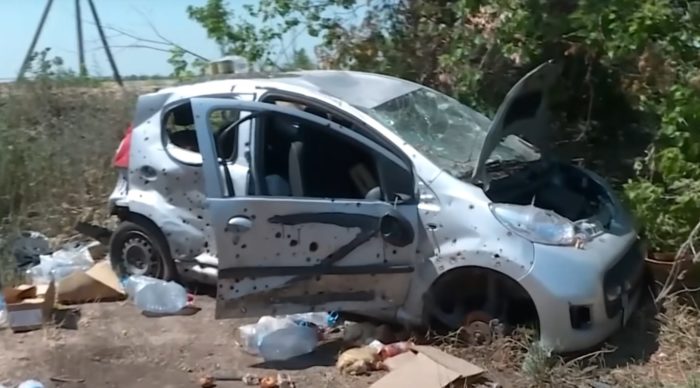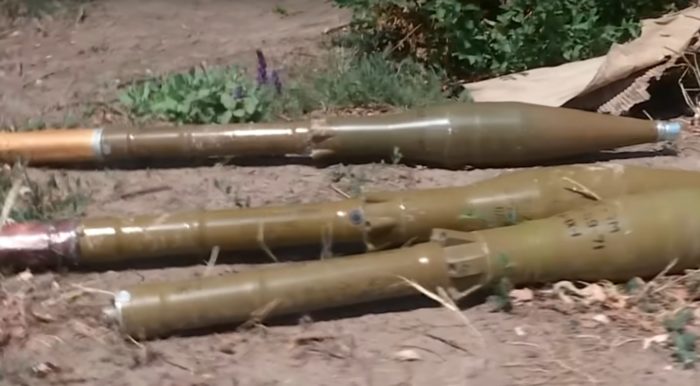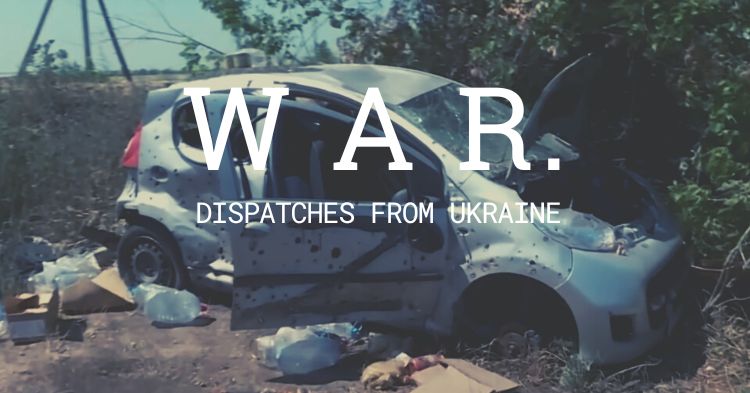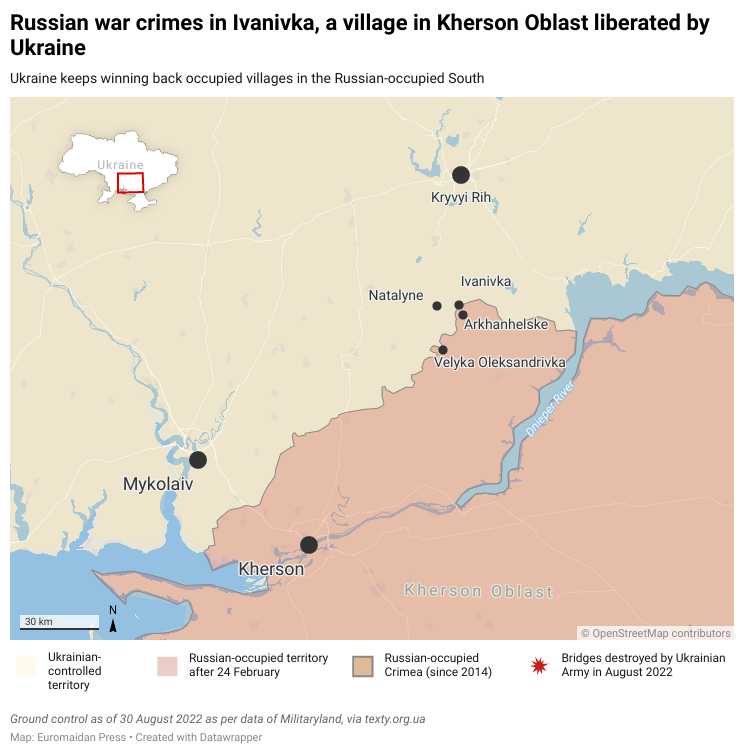Ivanivka is a village located on a crucial road between Kryvyi Rih (Ukraine's steel capital) and occupied Kherson. Prior to the full-scale Russian invasion, Ivanivka, a wealthy community, had been under Russian control for four and a half months before its liberation.
For years, Russians and their soldiers had been fed lies about how Ukrainians lived in deplorable conditions, so when they invaded the city, the reality that a little town had Wi-Fi and bathrooms indoors was unbearable. Russians took their rage out on the residents, raping, torturing, and slaughtering their way through the community.
When the Russian army seized the village, practically all its residents were forced to flee. Naturally, leaving your home is an exceedingly difficult task to do. Let alone for those faced with the decision, flee and survive or flee and abandon your beloved farm animals to fend for themselves: cows, pigs, chicks, and ducks. And considering the Russian troops' brutality, it wasn't an easy thing for residents to decide.
Moreover, for the majority of Ivanivka residents, farming was their sole source of income. So evacuating meant not only leaving behind their home and memories they have built for centuries but also their only means of income.

On 11 July, after a series of brutal battles, the Armed Forces of Ukraine liberated the village, but the main route to Ivanivka had been sealed off. Soldiers refused to let people leave because there was a significant risk of being blown up by Russian-placed mines.
Nobody knew where or how many the Russians left these, as the soldiers call it, "gifts." As a result of the road closure, the only option was to take the country roads. That was also extremely dangerous. After being driven out of Ivanivka, the Russians began bombarding it with heavy artillery.

Still, I dared to take the risk. The temperature had reached 35 degrees Celsius at the time. Field roads had entirely dried up, and driving across them reminded me of the desert roads of the Paris-Dakar rally. A military truck was just in front of my car, spewing a huge amount of dust into the air, making it almost impossible to see. One of the young soldiers who approached me at the improvised block-post was wiping the dust from his eyes.
“We're not going to let you go any further. A Russian mine blew up a local on his way to the village yesterday. The road is too dangerous."
A first-hand account from those who survived Russian occupation in Kherson Oblast
Viktoria Dashko:

"From the first day of Russian annexation, they immediately started doing what they do best: murdering and stealing," Viktoria Dashko, a resident of Ivanikva, said.
“They held a pistol in one hand and a bottle of liquor in the other. I was out with a neighbor and spotted a vehicle flying towards us at speed. We rushed back into the backyard. The Russians jumped out of the jeep and surrounded us, asking why we had run away, suspicious of something else.
They took our phones, but we merely gave them our old ones (we were fully prepared for their stupidity, we had already heard the stories of other towns), and they said we could have them back in the morning.
They were annoyed because my father had a Ukrainian flag in his yard and threatened to burn it in front of us if we didn't take it down. They threatened to kill my father because he told them how they were not liberators (as they called themselves) but looters who stole everything we had.
Even though I worried for my life every time I did it, I communicated with my Ukrainian military buddies every day and reported back information about the ‘orcs’’ positions even when there was no electricity or mobile connection.
I would ride my bike to the edge of the street, searching for a cell signal, and then send all they needed to know. Every day, Russians went door to door, removing items such as food and household goods. They were astounded to find running water, a toilet, and modern household equipment as if they had never seen it before.
The Russians promised us they would never allow Ukrainians to live better lives than they do. Simply put, they wanted Ukrainians to endure the same appalling conditions as them.
One day, my father lost it. He couldn't live like this for a second longer, and we all agreed that it was time to put an end to it. I hurried across the street to see my family on the other side of the street, hid in the toilet (the only place with mobile service), and called my friends, asking them to meet us in the nearby village of Zarichne. It was time for us to get out of there.
After coming home, our entire family quickly gathered the most vital stuff we could hold in our arms and got out of the village as quickly as we could. Our friends were not able to get to us that night, so we spent the night in Zarichne before walking 15 kilometers to the Natalyne village and on to Kryvyi Rih city."
Maryna Mchedlishvili:

"There were soldiers of the so-called ‘DNR’ (Donetsk's people republic) in our village in the early days of occupation, as well as the rest of the remnants of the Mongol-Tatar horde," Maryna said, referring to Buryats and Russians.
"Kadyrovites lived on the land of two neighboring villages, Velyka Oleksandrivka and Arkhanhelske.
These murderers had been stationed at a school, a bar with a large amount of alcohol, and an ambulance since the onset.
Fast-forward a few weeks, and there were times when Russians were short on housing. So they literally went round, door-to-door, and simply forcefully removed people from their homes, so they could live there… Animals.
I didn't hear anything about rape, but I'm sure it happened. People choose to keep silent about those types of crimes. It's terrible. However, there have been reports of torture and kidnapping.
The fate of those who were tortured is unknown. Russians kidnapped my friend and then my neighbor a few days later. During the occupation, Russians kidnapped and murdered a fellow villager, who was later discovered tortured to death in a nearby village.
Strangely enough, and I can't get my head around this, Russians were carrying out these attacks against their own people and soldiers. One of the ‘clean’ Russians chose to flee by hiding in the basements of people who remained under occupation. He fled again after spending a day there and realizing they were after his head and wouldn't stop until they got it.
Later that day, the boy was captured and shot square in the head. His body, or what was left of him, was splatted on the ground outside. Left there as if to warn the others.
This was constant. Actually, it was the only constant thing that happened throughout this period. They humiliated and looted the villagers and stole everything in sight.
Young ladies subjected to prolonged occupation were forced to dress sloppily and draw bruises under their eyes, doing anything to appear elderly and unattractive.
I had to wear a ragged robe and scarf to cover myself up as much as possible while keeping a bucket of liquid manure on hand to dump on my girls and myself if they tried to rape us, not knowing if this would put off those pigs.
They forbade us from burying civilians in cemeteries, but instead, we had to bury the dead near our homes. Unfortunately, my father did not survive the horde's onslaught. We loaded his body onto the cart and drove him to his final resting place. His body was still warm beneath the blanket."
Related:
- The untold story of the first battle for Kherson
- He was a Putin fan. Then Russians bombed his house
- Russian war crimes in Katiuzhanka: torture chamber, toilets in classrooms, and stolen lingerie
- Cruelty, murder, and destruction in Bucha
- Killed for refusing to shout “Glory to Russia!”: Russian war crimes in Trostianets
- The Ukrainian Aleppo, or unprecedented terror in Borodianka – Dispatch from Ukraine


